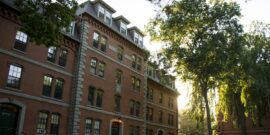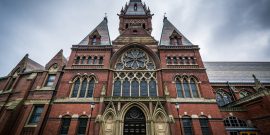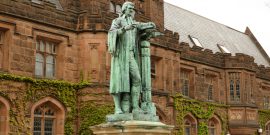The only way to change the university’s direction is strong leadership from the top, and that doesn’t appear likely.
James Hankins
Sometimes diversity is our strength, but more often it isn't.
In the premodern world, equality was compatible with liberty. It’s time to return to that conception.
Instead of relying on government, the US could rebuild the middle class through private investment, income support, debt relief, and job training.
A recent debate on meritocracy at Harvard revealed deeper questions about the purpose of the school.
Our efforts must focus on depoliticizing higher education.
If everything is political, we inevitably lose a sense of the intrinsic importance of academic disciplines and the search for truth.
The Civics Alliance wants to reform American schooling, but can it defeat The Blob?
Ferenc Hörcher argues that prudence, not justice, should be the basis of a political philosophy of conservatism.
We shouldn’t allow academic freedom to be defined by its enemies.
Can UATX reclaim what used to be the heart of historical study: political, institutional, military, and diplomatic history?
The renewal of American education will come from private schools, charter schools, and classical education.
James Hankins outlines a path forward on an education that prepares students for a life of dignified freedom and citizenship.
It might be possible to foster a new elite in the next generation with better values than the current one, but that would require us to look to history.
“Diversity and inclusion,” the seemingly harmless slogan of progressive educators, reveals itself as a cover for the soft bigotry of low expectations.
As modern history has proven over and over again, progress occurs in an environment of ordered liberty; authoritarian societies are stagnant societies.
Elite universities are abandoning traditional liberal arts education, but new institutions are filling the gap.
Recent years made it clear that we were being governed by a corrupt oligarchy out of tune with traditional American political norms.
True progress in human government must allow expression to the popular will, but also restrain it by just laws and wise leadership.
The difficulty with the reparations argument has always been practical, not moral. It lies in the questions, by whom? to whom? and how much?
The University of California decides to phase out the SAT and ACT, and abandons the idea of merit.
More democracy is not always the best solution to the problems of democracy, but in the case of a pandemic, it may be our best hope of reasoned action.
James Hankins is a professor of History at Harvard University and a Senior Writer at Law & Liberty. His most recent books are Virtue Politics: Soulcraft and Statecraft in Renaissance Italy and Political Meritocracy in Renaissance Italy.





















